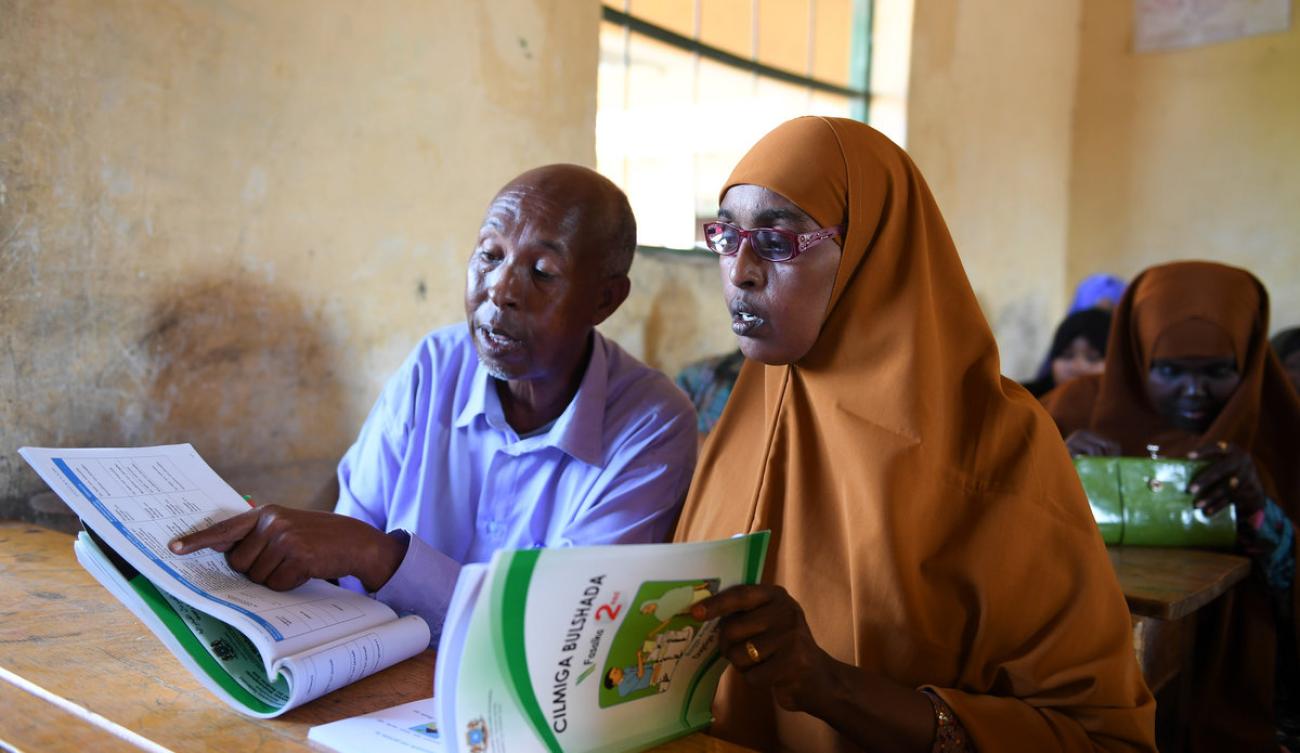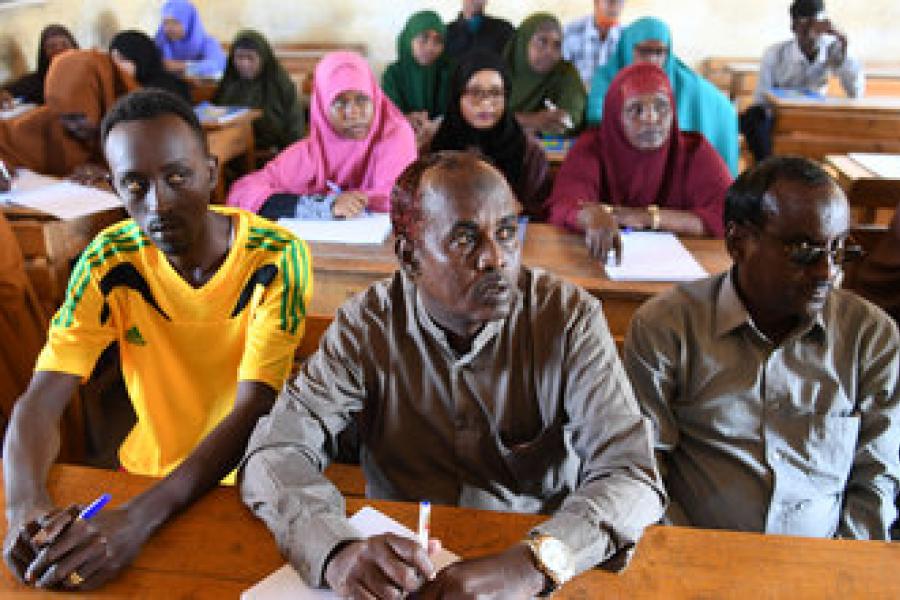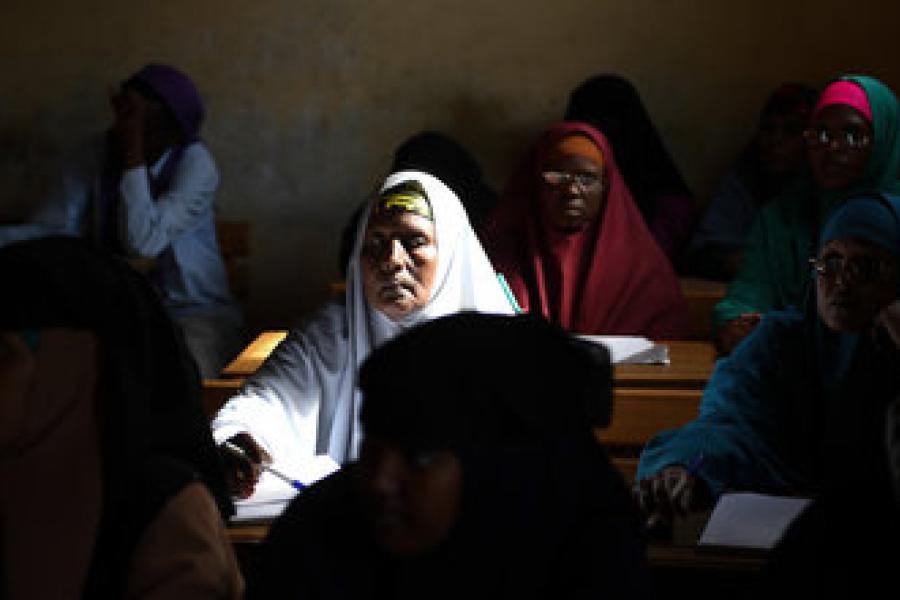A new way to educate in Somali schools starts in August

One of the major differences in the new curriculum will be the language of instruction.
Somalia’s civil war wrenched the country in many ways.
Families were torn apart, the rule of law faded away, government institutions collapsed, and education came to a standstill, to name but a few of the setbacks the country faced because of the violence.
In the ensuing decades after the war’s end, the area of education slowly regained some structure as the authorities – aware of its importance for the country’s long-term development – tried to get it back on track.
However, this led to a laissez faire situation with a mish-mash of systems and structures for primary and secondary schools, which adopted any system their owners deemed fit. Even school terms and school books varied across different parts of the country.
All that will change next month.
“For the last 30 years, the country has been craving for a Somali-owned and Somali-prepared education system – we finally have it,” says Mohamed Abdulkadir, an advisor to the Federal Government’s Ministry of Education, and the official charged with overseeing the implementation of a new education system, including a new national curriculum, across Somalia.

In early August, after students finish the usual two-month summer break, the horn of Africa country’s education system will undergo a major transformation with the adoption a new, unified and streamlined system for primary and secondary schools, covering everything from subjects to terms.
Under the new system, commonly referred to the ‘4-4-4 system,’ students will spend four years in lower-primary education, four years in upper-primary and another four years in secondary school before being able to enroll in institutions of higher learning.
In addition, students with talent in different fields, including sports, music and art, will be identified and nurtured to realise their full potential in these areas.
“Our aim is to ensure our children access to education as well as opportunities where they can exploit their talents for their benefit and that of the country,” says Mr. Abdulkadir.
The school calendar year will be divided into two academic terms, with the first term running between January and May, and the second from August to December.
In preparation for the new system, the federal authorities had put in place a pilot programme in various schools in the capital, Mogadishu, and teachers around the country have been undergoing training since the beginning of June.
Some key changes in the curriculum
One of the major differences in the new curriculum will be the language of instruction. During the civil war, because of a shortage of books in Somali, schools used whatever text books they could obtain. These were sourced from more than ten countries, leading to English and Arabic replacing Somali as the language of instruction.
“Now the language of instruction in primary school will be Somali, while Arabic and English will be used in secondary school,” says Mr. Abdulkadir, a former Director-General in the federal Ministry of Education. “We believe this will bring some order.”
It is a view shared by current students.
“For the first time I can see specific books authorized by the government for each subject. We have been subjected to books from different countries during our time in primary school,” says grade seven student Abukar Ilyas Mohamed.

There will be seven core subjects – mathematics, science, social studies, Islamic studies, Arabic, English and Somali – as well as classes on cross-cutting topics such as peace and health. Classes centred on the Koran will be included within the subject of Islamic studies.
In order to encourage a spirit of entrepreneurship among Somali youth and in recognition of its role in the global era, the government has added information and communication technology (ICT) to the list of subjects to be taught under part of the new system.
“The core subjects in the new curriculum will remain seven, while ICT will be the only new subject introduced in upper-primary owing to its importance in the modern world,” says Mr. Abdulkadir.
The 65-year-old education official adds that the new system has been well received at the federal and state levels.
In a departure from the current system, under which students are required to sit for national exams to proceed from primary to secondary school, and, eventually, university, students will now undergo continuous assessment so as to ensure a more holistic approach to education, less centred in passing a few key tests.
“We believe the new curriculum is a better option, since our aim is to produce students who will not only be competitive but also become academic thinkers by the time they complete secondary education,” says Mr. Abdulkadir.
According to the United Nations, Educational, Scientific and Cultural Organization (UNESCO), Somalia has one of the world’s lowest enrolment rates for school-aged children. UNESCO estimates there are 4.4 million out-of-school children, almost half of the country’s total 9.2 million people. In other words, only four out of ten children are in school.
UNESCO notes that the country is still far from reaching the Sustainable Developmental Goal of ensuring inclusive and equal quality education. However, the UN agency adds, the trend can be reversed with the development of standard quality literacy and life skills training, which can help to improve access and equity to education.
Mr. Abdulkadir believes that with proper support the new system will help improve enrolment rates, since the country is expected to revert to its pre-war policy of offering free and compulsory basic education.

Teachers and students looking forward
The new system has already raised expectations and led to some excitement among teachers and students.
Muhidin Abdullahi Mohamoud, an Islamic Studies teacher undergoing training at Wiilwaal School in Mogadishu, says the new curriculum is more student-oriented and student-friendly in its approach.
“We all need to embrace this curriculum because it has the best interests of the country and for the future generation, which I am part and parcel of nurturing,” Muhidin notes.
His colleague, Farhia Abdalla, a veteran English teacher with 18 years of experience, believes the subjects to be taught are ideal for Somalia.
“This new curriculum is based on our environment,” she notes. “It provides answers on the type of students to be produced, while taking into consideration Somalia’s culture and heritage.”
Some students currently enrolled under the existing system lamented that they would not be able to benefit from the changes.
“It is unfortunate that I will not be part of,” says Hanif Abdulkadir Adane, who hopes to become a medical doctor, and is currently preparing for the year eight national exams. “But at the same time, I’m happy for the juniors because they will go through a better, organized curriculum
Link to original story.

